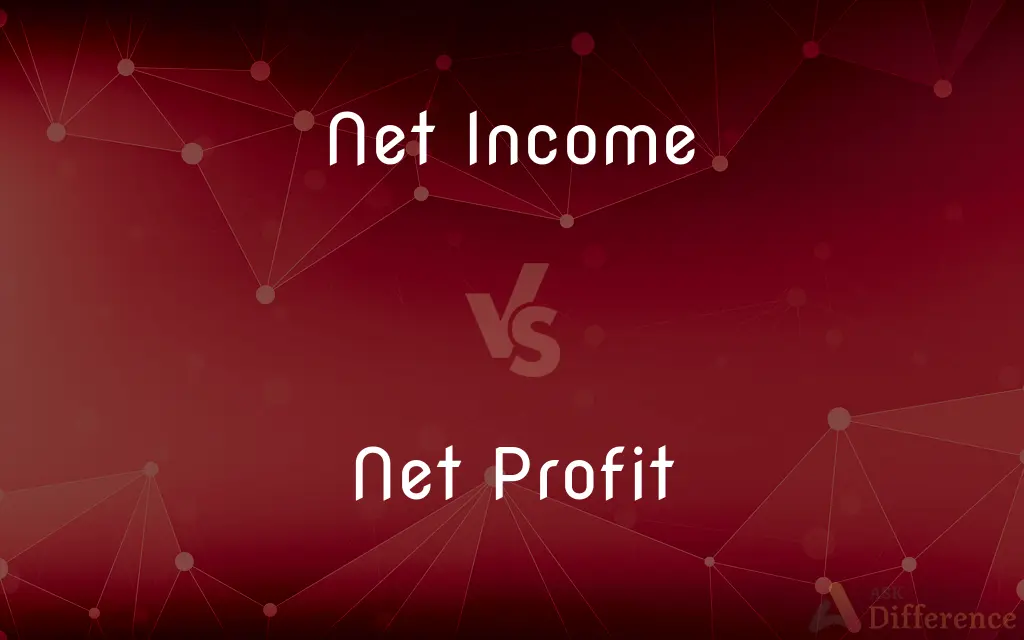Net Income vs. Net Profit — What's the Difference?
Edited by Tayyaba Rehman — By Fiza Rafique — Published on December 29, 2023
Net Income and Net Profit both refer to the amount a company earns after deducting all expenses from its revenues. They are essentially synonymous in financial terminology.

Difference Between Net Income and Net Profit
Table of Contents
ADVERTISEMENT
Key Differences
Net Income is a term commonly used in financial statements to describe the final earnings of a company after all expenses are taken out. Similarly, Net Profit is used to depict the same concept, indicating the actual profit after all deductions.
In financial accounting, Net Income is a prominent figure, showcasing the total earnings remaining after costs like operational expenses, taxes, and interest have been subtracted. Net Profit, on the other hand, is an interchangeable term with Net Income, emphasizing the clean profit a company has made.
Net Income serves as a crucial metric for stakeholders to gauge a company's profitability over a given period. Net Profit serves the same purpose, highlighting a firm's financial health and its capacity to generate earnings after expenses.
While Net Income might sometimes be broken down into categories such as "operating" or "non-operating" based on the nature of the income, Net Profit typically signifies the final figure without specification. However, in many contexts, both terms are used interchangeably.
In financial discussions, Net Income is often the go-to phrase when detailing a company's earnings performance. Net Profit, though used similarly, might be favored in discussions emphasizing the "profitability" aspect more directly.
ADVERTISEMENT
Comparison Chart
Definition in Accounting
Earnings after all expenses.
Earnings after all deductions.
Usage
Common in financial statements.
Often used interchangeably with Net Income.
Emphasis
Focuses on total earnings after costs.
Emphasizes clean profit after all expenses.
Categorization
Sometimes categorized (e.g., operating).
Typically a final, undivided figure.
Linguistic Preference
Frequently used in formal financial discussions.
Might be favored in profitability-focused discussions.
Compare with Definitions
Net Income
The bottom-line figure indicating a company's profitability.
Investors closely watch the Net Income to gauge a firm's financial health.
Net Profit
The earnings left after deducting all business expenses.
Their Net Profit margins improved due to efficient cost management.
Net Income
The sum left after all financial obligations are met.
Their Net Income was commendable, given the challenges they faced this year.
Net Profit
A company's true earnings after all financial deductions.
The focus this quarter is to enhance the Net Profit through strategic initiatives.
Net Income
The residual earnings after all expenses are deducted from revenues.
After considering all operational costs, the company reported a Net Income of $2 million.
Net Profit
The end result of revenue minus all operational costs.
They aim to increase their Net Profit by optimizing their supply chain.
Net Income
Total earnings post the subtraction of costs, taxes, and other expenses.
Despite higher sales, their Net Income was affected by increased production costs.
Net Profit
The conclusive income after all costs and expenses.
Shareholders were pleased with the substantial Net Profit the company reported.
Net Income
The final profit figure on an income statement.
The Net Income showed a 10% growth compared to the previous year.
Net Profit
The ultimate profitability figure of a company.
Despite higher revenues, the Net Profit remained constant.
Common Curiosities
Which term is more common in formal financial reports?
Net Income is often the preferred term in formal financial statements.
Can a company have high revenues but low Net Income or Net Profit?
Yes, if a company has high expenses, it can have high revenues but a low Net Income or Net Profit.
How does depreciation affect Net Income and Net Profit?
Depreciation is an expense and reduces both Net Income and Net Profit.
How does Net Income impact shareholder value?
Higher Net Income usually translates to increased shareholder value as it indicates good financial health.
Are Net Income and Net Profit the same?
Yes, both Net Income and Net Profit refer to earnings after all expenses are deducted.
Is Net Profit always a positive figure?
No, if expenses exceed revenues, Net Profit can be negative, indicating a loss.
Can a company have a positive gross profit but a negative Net Income or Net Profit?
Yes, if operational and other expenses exceed the gross profit, the Net Income or Net Profit can be negative.
Is Net Income always the final figure on an income statement?
Typically, yes. Net Income is often the bottom-line figure on income statements.
Do dividends impact Net Profit?
No, dividends are a distribution of profits and do not impact the calculation of Net Profit.
Are taxes included in the calculation of Net Profit?
Yes, taxes are deducted to arrive at the Net Profit figure.
Do all companies use the term Net Profit in their reports?
While many do, some might exclusively use Net Income or other terms to denote the same concept.
Which is a better indicator of financial health: revenues or Net Profit?
Net Profit, as it takes into account all expenses and gives the actual profitability.
How does a company's debt affect its Net Income and Net Profit?
Debt can affect interest expenses, which in turn reduces Net Income and Net Profit.
Can companies manipulate their Net Income or Net Profit figures?
While there are ethical accounting practices, some companies might use creative accounting to present better figures.
How do interest expenses affect Net Income and Net Profit?
Interest expenses are deducted, reducing both Net Income and Net Profit.
Share Your Discovery

Previous Comparison
Navy Seals vs. Delta Force
Next Comparison
F-14 vs. F-15Author Spotlight
Written by
Fiza RafiqueFiza Rafique is a skilled content writer at AskDifference.com, where she meticulously refines and enhances written pieces. Drawing from her vast editorial expertise, Fiza ensures clarity, accuracy, and precision in every article. Passionate about language, she continually seeks to elevate the quality of content for readers worldwide.
Edited by
Tayyaba RehmanTayyaba Rehman is a distinguished writer, currently serving as a primary contributor to askdifference.com. As a researcher in semantics and etymology, Tayyaba's passion for the complexity of languages and their distinctions has found a perfect home on the platform. Tayyaba delves into the intricacies of language, distinguishing between commonly confused words and phrases, thereby providing clarity for readers worldwide.











































